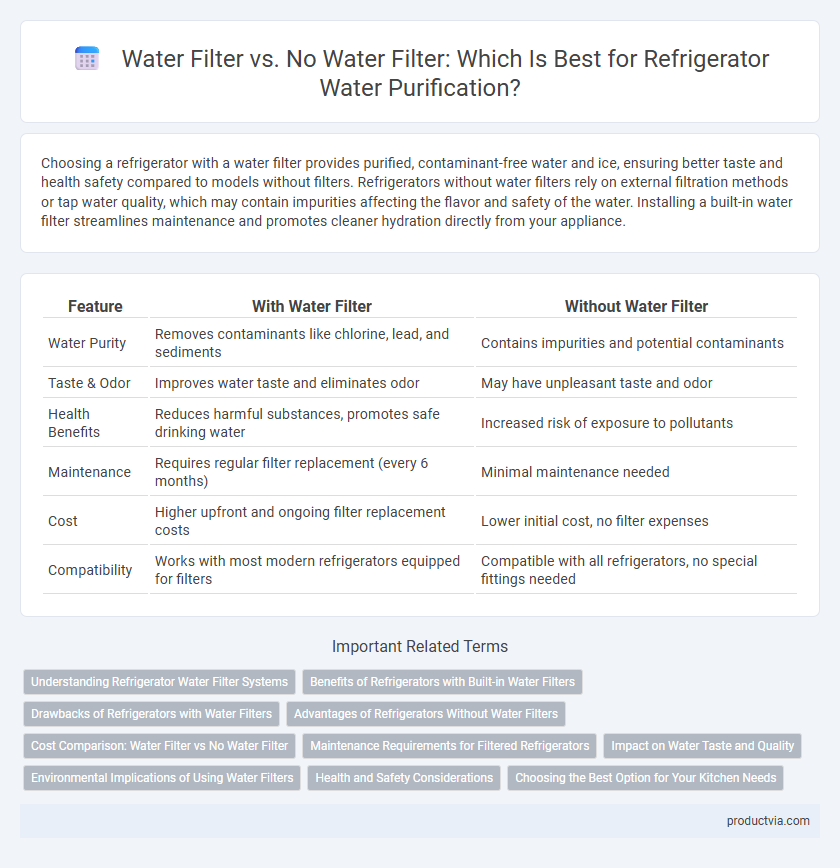Choosing a refrigerator with a water filter provides purified, contaminant-free water and ice, ensuring better taste and health safety compared to models without filters. Refrigerators without water filters rely on external filtration methods or tap water quality, which may contain impurities affecting the flavor and safety of the water. Installing a built-in water filter streamlines maintenance and promotes cleaner hydration directly from your appliance.
Table of Comparison
| Feature | With Water Filter | Without Water Filter |
|---|---|---|
| Water Purity | Removes contaminants like chlorine, lead, and sediments | Contains impurities and potential contaminants |
| Taste & Odor | Improves water taste and eliminates odor | May have unpleasant taste and odor |
| Health Benefits | Reduces harmful substances, promotes safe drinking water | Increased risk of exposure to pollutants |
| Maintenance | Requires regular filter replacement (every 6 months) | Minimal maintenance needed |
| Cost | Higher upfront and ongoing filter replacement costs | Lower initial cost, no filter expenses |
| Compatibility | Works with most modern refrigerators equipped for filters | Compatible with all refrigerators, no special fittings needed |
Understanding Refrigerator Water Filter Systems
Refrigerator water filter systems utilize activated carbon and ion exchange resin to remove contaminants such as chlorine, lead, and sediment, ensuring cleaner and better-tasting water. Refrigerators without water filters rely solely on municipal water treatment, which may leave impurities that affect water quality and appliance longevity. Understanding the benefits of integrated water filters helps in maintaining optimal water purity and prevents buildup that can impair refrigerator performance.
Benefits of Refrigerators with Built-in Water Filters
Refrigerators with built-in water filters provide cleaner, safer drinking water by reducing contaminants such as chlorine, lead, and sediment, enhancing taste and odor. These filters support better health by minimizing exposure to harmful substances and encourage increased water consumption for hydration. Without a water filter, refrigerators may allow impurities to pass through, compromising water quality and requiring additional filtration methods.
Drawbacks of Refrigerators with Water Filters
Refrigerators with water filters often require regular cartridge replacements, increasing maintenance costs and effort compared to models without filters. Sediment buildup in water filters can reduce water flow and ice production efficiency over time. Additionally, malfunctioning filters may allow bacteria growth, compromising water quality and risking health concerns.
Advantages of Refrigerators Without Water Filters
Refrigerators without water filters offer lower maintenance and reduced replacement costs, eliminating the need for periodic filter changes. They minimize the risk of filter clogging or failure, ensuring consistent water flow and improved energy efficiency. These models also avoid potential contaminants introduced by poorly maintained or expired filters, providing reliable and hassle-free purification.
Cost Comparison: Water Filter vs No Water Filter
Choosing a refrigerator with a water filter involves an upfront cost typically ranging from $30 to $100 per replacement filter, with filters needing replacement every 6 months to maintain optimal purification. Refrigerators without water filters avoid these recurring expenses but may require external purification solutions or increased maintenance due to potential buildup from unfiltered water. Over time, the cumulative cost of filter replacements can exceed initial savings, making cost-effectiveness dependent on usage patterns and water quality in the household.
Maintenance Requirements for Filtered Refrigerators
Refrigerators with water filters require regular maintenance, typically involving filter replacement every 6 months to ensure optimal water quality and prevent clogs. Neglecting filter changes can lead to decreased water flow, potential bacterial growth, and compromised taste. In contrast, refrigerators without water filters reduce maintenance tasks but may provide less purified water, increasing reliance on external filtration methods.
Impact on Water Taste and Quality
Refrigerators with water filters significantly improve water taste and quality by removing impurities such as chlorine, lead, and sediment, resulting in cleaner and fresher-tasting water. Models without water filters rely on municipal water purification but may still allow contaminants and odors to affect the water's flavor and safety. Choosing a fridge with an efficient certified water filter ensures enhanced hydration and reduces exposure to harmful substances.
Environmental Implications of Using Water Filters
Using a refrigerator water filter significantly reduces plastic waste by minimizing reliance on bottled water and disposable cups, supporting sustainable consumption. However, the frequent replacement of filters generates filter cartridge waste that requires proper recycling to prevent environmental contamination. Choosing models with reusable or recyclable filters enhances eco-friendliness, making water filtration in refrigerators a greener alternative to unfiltered water sources.
Health and Safety Considerations
Water filters in refrigerators significantly reduce contaminants like chlorine, lead, and bacteria, enhancing the safety and taste of drinking water. Refrigerators without water filters may expose users to harmful impurities, increasing the risk of waterborne illnesses and negatively impacting overall health. Regular replacement of water filters is essential to maintain effective purification and ensure consistently safe water quality.
Choosing the Best Option for Your Kitchen Needs
Selecting a refrigerator with a built-in water filter enhances water purity by removing contaminants such as chlorine, lead, and sediments, which improves taste and safety. Models without a water filter require external filtration systems or bottled water, potentially increasing cost and inconvenience. Assess your household's water quality and usage patterns to determine if an integrated water filter aligns with your kitchen's health and convenience priorities.
Water Filter vs No Water Filter for Refrigerator Purification Infographic

 productvia.com
productvia.com